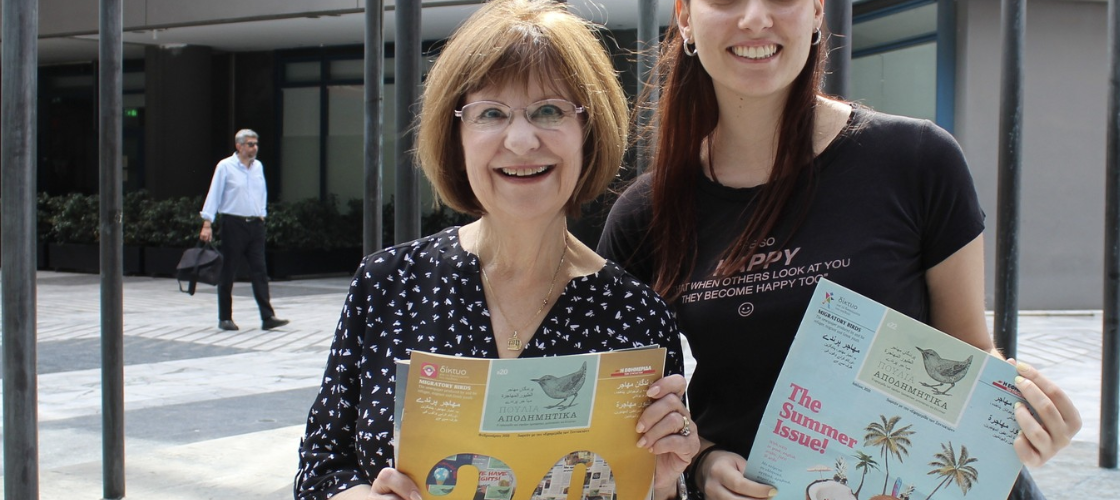The Migratory Birds team met Dr. Sandra Morgan, the director of Vanguard University’s Global Center for Women and Justice, where she works on combatting human trafficking and ending violence against women and children. In a very interesting conversation, we discussed domestic violence, human trafficking and the ongoing battle for the role of women due to the effects of the patriarchy. She joined the fight against domestic violence when she was working as a nurse and discovered an instance of child sex trafficking of a boy in California.
Dr. Morgan and the Migratory Birds met at a café, where we engaged in a discussion rather than in an interview or lecture. The more we talked the more we wanted to ask her about her own experiences, as an advocate for women’s rights and against human trafficking, whilst putting her perspective as a University Professor aside. She promotes the peer-to-peer approach in changing the mentality of youths, rather than didactics. This is the reason she believes in the Migratory Birds project, as it gives the space to young people to address other young people.
The first questions revolved around the meaning of human trafficking and smuggling. We often hear these terms, but we may have trouble distinguishing them. However, they do exist, and people do suffer because of them.
She explained the difference with an example:
“With regards to smugglers, you ask them to take you to Greece. You pay them €3000. When you get there, you get off the boat. They don’t know where you are. They have no control over you. However, you have committed a crime against the government of Greece being smuggled into their borders, but you are now free from the smugglers. On the other hand, in Human Trafficking, they tell you that they will get you to Greece for €3000, but you don’t have €3000 on hand. Hence, you agree to owe them, and you will pay them later when you get a job. A job perhaps in the strawberry field. When you get there and you get off the boat, they ask you to pay. Then they tell you that they will charge you interest, and they make you work where they tell you to. This is different from smuggling because you have no freedom of movement. When you say that you don’t want to do something, they remind you of your family. The threats, force, fraud and coercion differentiate it from smuggling. In human trafficking, you don’t have the freedom to leave. You don’t have the freedom to make your own choices”
As the director of Vanguard University’s Global Center for Women and Justice she visits Middle Eastern countries to advocate for women’s rights and representation in politics, which is not an easy thing when it comes to patrilineal societies.
In a patrilineal society, “men are everything and women are zero”. Once during a lecture on patrilineal societies, she illustrated with an example what patrilineal is for some regions. She used a genome chart that began with one’s family, their parents and their parents’ parents. In this chart only the father’s genome was included and not the mother’s. She then showed them another one that showcased that we get chromosomes and genes from both our father and our mother. Someone reacted and said no, I am like my tribe, like my father. This response is the definition of Patrilineal: “The idea that everything comes just through men. Property, value, everything. It is an honor-based society, so if the women in the family brought dishonor, they disobeyed the father. Killing, as a consequence, is an acceptable cultural norm. From a Western perspective we believe that women would fight that, but they do not. Patriarchy is when the foundations of society are built around men. When you look at all the people in the government, the people standing in front of you are all men. You are entirely in a patriarchal society where men make all the decisions for you.”
When asked about the role and opportunities for women, she told us stories from her experience while she was leading a delegation for women’s rights in the Middle East. The UN recommendations for women’s representation in parliament is 30%. “Some countries do meet the target, but only in the letter and not the spirit of the law. In those countries women were elected solely to fulfill this UN recommendation. They don’t have the power that comes with the position. They stay silent and just sit in the room”. Her project was to educate women and provide opportunities for professional development to be integrated in those kinds of recommendations. She remembers a girl who got the opportunity to become a summer intern at Georgetown University in Washington, DC. Her family refused to let her go because they believed that she would never be able to get married if she went. That girl was left behind because she didn’t have access to the same opportunities for professional development. “So, the opportunities are a really good question, but more importantly is how will she have access to those?”
Dr Morgan discovered that women need to learn “how to speak up because they’ve been trained to be silent if a man has the floor”.
Unfortunately, even this is not the case for Afghanistan. We couldn’t help but ask about her feelings and thoughts on Afghan women. She was devastated the day she heard that Taliban would not allow women to go to school. She believes that change can come from open schools where you can enhance the sense of ability and confidence in young women. She admits that when schools are closed, it is very hard for women to learn how to advocate for themselves and to envision how they could make a difference.
Dr. Morgan concludes that since women in such societies have been living in a culture where they are expected to stay at home and have little if any freedom, it is very difficult to change these beliefs as they are deeply embedded into them. In her opinion the issue is more about culture rather than religion and she hopes international support for women is provided, so they are admitted back into school.









Add comment